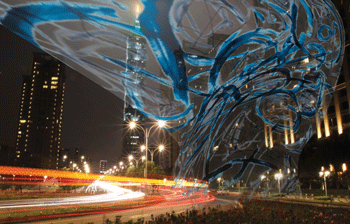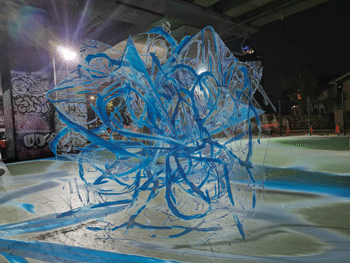 Another first for the area, Lost and Found: New Media Works by Carla Guzman opens at Gallery 208 on Aug. 17. Her first one-person exhibition since earning a Master’s in Fine Art in Contemporary Art at the China Academy of Art in Hangzhou, Republic of China. During her studies, Guzman’s focus was new media in the visual arts.
Another first for the area, Lost and Found: New Media Works by Carla Guzman opens at Gallery 208 on Aug. 17. Her first one-person exhibition since earning a Master’s in Fine Art in Contemporary Art at the China Academy of Art in Hangzhou, Republic of China. During her studies, Guzman’s focus was new media in the visual arts.
Attending the artist’s reception between 5:30 and 7 p.m., visitors will meet a young artist who is the daughter of immigrants from El Salvador, a small country that experienced civil war in the late 80s. Raised with the work ethic to achieve the American Dream she noted: “over the years I have become very Americanized, yet I will always be influenced by a background which stems from transgenerational trauma due to civil unrest and contradiction.”
Before completing the new media graduate degree in China and returning to the United States, Guzman had graduated from Fayetteville State University with an undergraduate degree in visual arts. For Guzman, the transition of ideas and meaning in new media was similar to the way she worked in traditional mediums, the challenge was learning the technology and programming.
Guzman stated, “I always come back to my roots in traditional image making, it is the most direct way to tap into my creativity. My process includes three steps: the initial drawings, the postproduction and then the translation to new media (which is still evolving). I can look at the digital work and identify the original matrix it came from and how it has evolved since then. For example, I might use a drawing from years ago again in a new work today. I tend to recycle images since emotions are at the core of my work and they remain constant.”
Guzman was asked about the advantages or disadvantages of working in different modalities or sensory systems and to comment on the idea of selecting images verses creating them without a computer. She was quick to explain how ways of working influence the modality you are using.
For example, she stated: “I was the type of printmaker that loved mistakes because they were always beautiful and interesting to me. Printmaking taught me not to become too attached to an end-product but follow the process. In a similar way, if my external hard drive becomes messed up or if something happened, half of my drawings remain on the other side of the world. I am okay because I have my operative system that I go by. In the same way as printmaking, I welcome these mishaps. Building upon previous work is interesting, but also, a clean slate is great because there is the challenge to improve things like technique and skill which applies to new media as well.”
It takes time to find one’s way in a technological medium that has been rapidly developing for the last 40 years, even faster the last 5 years, and Guzman is a newcomer. A constructive turning point was during her thesis research when she came across some of the earliest artists in the 1970s who were the first to mix art and technology. Discovering E.A.T. (Experiments in Art and Technology: a non-profit organization established in 1967 to develop collaborations between artists and engineers) and artists Robert Mallary and Harold Cohen was a way for Guzman to focus on a strategy to express herself in new media.
Guzman considers herself like Harold Cohen, the artist who created AARON - a computer software program that generated compositions on its own, allowing the artist to create several compositions in the course of a few days. Guzman takes a similar approach to Cohen: “I like that a computer can generates many images, then I select the best and develop my imagery from the successful ones. It allows for more iterations of the same image without totally abandoning the original one.”
In addition to developing new technological skill, the time Guzman spent in China influenced the artist in many other ways: “The graduate program in China was an international curriculum with professors from top art institutions around the world and in China. It was an amazing nonwestern experience that led to opportunities for travel in China and meeting with contemporary Chinese and international artists, emerging and established. Your sensibilities and viewpoints change when you are not able to communicate or understand anything other than the images in front of you.”
Guzman lived in China three years, and then due to the pandemic, lived a year and a half in Taiwan before returning to the USA. Lost and Found includes works from her graduate thesis exhibit titled Contemporary Emotion-Based Multimedia Art: Artistic Strategies and Viewer Response and works while living in Taiwan.
Guzman describes herself as “digital abstract expressionist” and her works are “essentially maquettes which are meant to be spatial emotional sculptures within the real world and the void. The works completed while living in Taiwan were during my time of being displaced in Taiwan due to the pandemic. The result was efforts to integrate emotional sculptures, feelings of loss and chaos, in actual location in Taiwan.”
In seeing Guzman’s “emotional sculptures,” visitors to the exhibit will need to reconsider what it means for something to be a sculpture. Traditionally we think of sculpture as a tangible object that has been physically carved, modeled or cast in a material. The world of virtual reality and other new media platforms are most often illusionary - but ever present. The semantics of what it means to be a sculpture in a new media world has been forever altered to have new meaning, new forms - with this comes new sensibilities about experiencing the object/nonobject and the making of the object/nonobject.
In describing her images, new explanatory words are used to refer to their existence which would never apply to traditional sculptural forms. For example, in the early works titled “Taipai Tower 1” and “Yuanshuan Series,” Guzman has created floating sculptural forms in cityscapes. Hard-edge linear forms appear and disappear as if in dissonance with the space. The sculptures are not static but living, expanding and contracting. Reflective color and form interrupt the space and yet inhabit the space in a palatable way. There is sense these sculptures are never permanently located but continuously move themselves.
Compared to the earlier work, the “Hualian Series” is a sculptural series made of light, sometimes colorless as well as the colorless becoming refractive color. Located on a shoreline, seeing the series next to each other, it is if we do not move closer to the sculpture, but the sculpture moves closer to us. The spinning forms in earlier works are now a vaporous wall; not inhabiting the space but appearing as energy and potential.
For anyone who visits Lost and Found, the artist would like viewers to “leave the exhibit feeling like they saw some beautiful images but also possibly formed some associations from their own experiences with her ‘emotional sculptures’ since emotions are innately part of all of us.” After recently returning to Fayetteville after living abroad for almost 5 years, Guzman shared she is presently “in the process of getting found” and looking forward to “networking and collaborating with new media artists.”
The public in invited to meet the artist and attend the public reception of Lost and Found: New Media Works by Carla Guzman on Aug. 17 from 5:30 to 7 p.m. at Gallery 208 located at 208 Rowan Street. The exhibit will remain up until the end of October. Gallery hours are 9:00 a.m. to 5:00 p.m., Monday-Friday. For information call 910-484-6200.
Pictured Above: "Taipei Tower 2 with Blue Series" by Carla Guzman.
Below: "Skate Park with Blue Series 3" by Carla Guzman.
